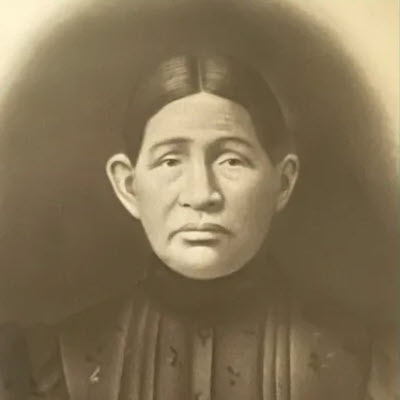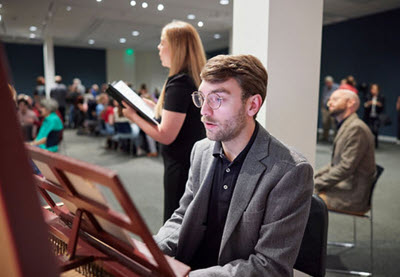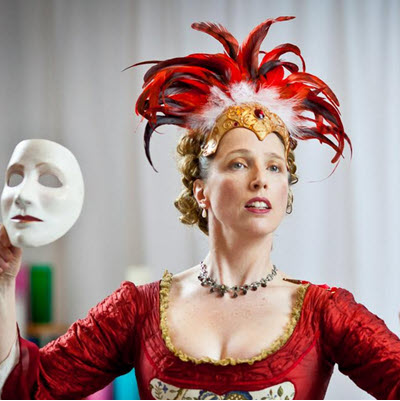by Anne E. Johnson
Published October 9, 2023
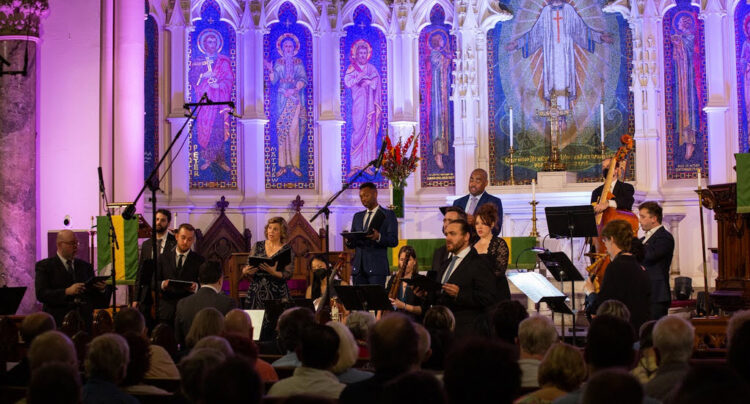
In Latin, tenere means “to hold.” In English, a “tenet” is a belief. When soprano Jolle Greenleaf founded TENET in 2009 — now TENET Vocal Artists — she chose the name because “I was holding onto something I believed in.”
The New York-based organization opens the 2023-24 season, its 15th, with eight programs. The theme is music by, for, and about women. “It’s not to make the point that men are not important,” Greenleaf says. “It’s to ask what changes in the sound, what changes in the dynamics, and how do we interact with each other? And then does that start to look gradually more normal every time?”
For the season opener, “Angels & Queens” (Oct. 21), Greenleaf insists the program of Purcell and Blow fits the theme: “We’re highlighting music for the blessed Virgin Mary, Saint Cecilia, and Queen Mary, poetry that not only talks about them but shows their perspective.”
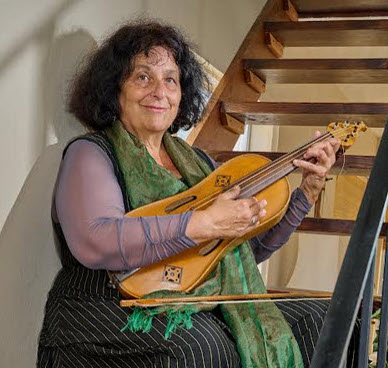
Vielle-player and singer Shira Kammen (who was on the cover of EMAg in Sept. 2022) will curate and perform in three medieval programs, including a co-production with Music Before 1800 on Nov. 19, “The Lady Fortune,” featuring music inspired by that goddess. On Dec. 7 at Trinity Wall Street, “Unconventional Women,” offers music by 17th-century nuns, “wonderful women who were cloistered from young ages but found freedom within their lives in convent settings where they could compose and dedicate themselves to music,” Greenleaf says.
“The Power of Mythology,” April 20, deals with three female characters: Sappho (using poetry by Christine de Pizan and Larry Rosenwald), Jacquet de la Guerre’s cantata Judith, and a Hindu goddess explored through new music commissioned from Reena Esmail.
Even the season finale, Bach’s B-minor Mass, on June 1, is said to relate to the female-centric theme. Harpsichordist Jeffrey Grossman has been collaborating with TENET singers as leader of his instrumental group, the Sebastians, including larger-scale projects such as Bach’s St. John Passion in 2017. He emphasizes that for the upcoming B-minor Mass, it’s more than just hiring mostly women for the orchestra: “It’s majority female section leaders.”
Grossman will lead the Bach from the keyboard. “I try almost never to work with someone who just stands and conducts,” says Greenleaf. “Jeff gives us the space and freedom to directly communicate to audiences rather than through him.”
“For the performers, it’s really scary at first,” Grossman says. When a conductor is present, “you tend to turn your ears off. If there’s no conductor up there, all your senses are heightened. You have to be connecting across the orchestra. It’s about turning these big pieces into chamber music.”
After the New York season wraps up, TENET will go on a five-performance trip to Germany in early June.
Collaboration from the Top
When Greenleaf’s previous ensemble, the Tiffany Consort, disbanded, she used its non-profit to start the project-based TENET. “I felt like New York was at a stage where it could really use more professional ensembles on the scene,” she said in a recent conversation. Concurrently, she spearheaded the Green Mountain Project to celebrate the 400th anniversary of Claudio Monteverdi’s 1610 Vespers. That turned into a decade-long series that helped maintain a devoted following for TENET.
Some of the singers and instrumentalists Greenleaf regularly hires have a long association with TENET. Bass-baritone Jonathan Woody first met Greenleaf when he moved to New York in 2010 and was singing at Trinity Wall Street Church. Mezzo-soprano Kate Maroney also met Greenleaf at one of New York’s early-music hot-spots, Holy Trinity Church, a decade ago. The sought-after singer and teacher says she prioritizes work with TENET “because I know it’s going to be world class and really interesting.”
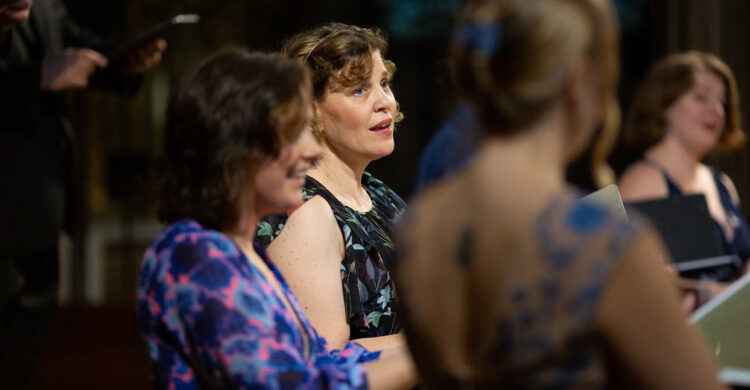
Among other artistic ideals, Greenleaf insists on accessibility for the audience. All of TENET’s in-person concerts are livestreamed, and some performance videos are available free on their Listen Any Time page.
That’s all part of leading an organization, Greenleaf believes. Instead of “someone at the top who makes all the decisions and barks orders to everyone else,” she focuses on communication. “I frequently ask my colleagues, ‘Do you want to develop a program?’ That feels genuinely like what we need more of on the landscape.”
Besides being a singer, Elisa Sutherland is TENET’s grants manager. She identifies the organization’s threefold mission: “To present high-quality early music, to perform underrepresented repertoire and reimagine how we perform the canon, and to help make the early-music scene in New York sustainable for musicians.”
To the last point, Greenleaf actively embraces DEI values — diversity, equity, inclusion — “retooling and rethinking the way that we present our music and tell the stories. We want people to feel that we are a wonderful place to land.” To attract more diverse musicians, in 2020 she started a mentorship program called Talks with TENET. It addresses a basic question for people just out of school. As Greenleaf explains: “How do you get to know the landscape and the network so you can feel like you’re part of it?”
The mentoring takes place via Zoom meetings. Experienced singers speak on relevant topics and field questions. The mentees are usually recommended by faculty at early-music programs. In the Fall 2023 term, there are 17 mentees — 10 in the New York area, mentored by Woody, and the others around the country, mentored by Arianne Abela. Guest mentors come in for single meetings.
“We chat about professional life as freelance vocalists,” said Woody. “I share anecdotes from experiences that I’ve had and speak with them about their particular challenges. I also offer as much practical advice as I can, like names of people to contact and competitions that are worth applying for.” To increase accessibility, Greenleaf made this program free.
“It would be great if TENET were able to bring artists together to train for a period of time,” says Woody. Another of his visions for TENET’s future is more staged works. “An opera or smaller masques would work well with the nimble cast and setup that we have.”
Projects like operas often flourish best with collaboration, a skill Maroney says Greenleaf has in abundance. “She has a good spirit of collegiality among other organizations.”
Woody agrees: “There’s always a sense of trust and camaraderie in the ensemble.” That’s all down to Greenleaf, says Maroney. “It’s her baby. The programming, the personnel, the tone she sets, the way the website looks. Everything.”
“Shared resources definitely help everybody,” counters Greenleaf, who welcomes anything to ease her task. “My biggest advice is ‘One day at a time.’ I’m personally very tenacious, and I can be driven to a fault. That personality flaw has actually been a benefit.”
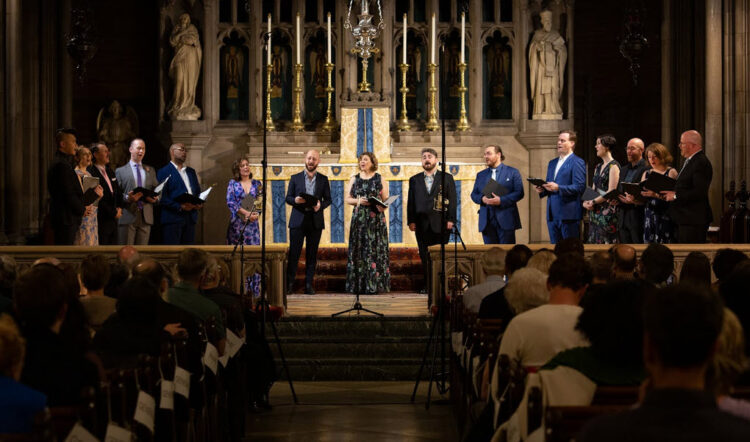
Her other key advice: “Ask for help all the time.” That’s not to say she doesn’t do too much herself. “The way I keep my admin costs low is that I do most of the work.”
That commitment makes TENET and Greenleaf seem synonymous. “As long as Jolle is continuing,” says Maroney, “I see TENET continuing to grow in exciting ways.”
That’s not Greenleaf’s perspective. “I do find myself getting more tired, although I don’t love the music less,” she says. “I feel like years before somebody decides to leave, they should be thinking about what their exit strategy is going to be. I’ve been trying to strategize — what does the community need most? How can I continue to serve this music that I love?”
Greenleaf is convinced she still has something to contribute. “I very much believe that this music has healing powers, that it’s important for us as humans.” So for now, she stays. One day at a time, as a new TENET season begins.
Anne E. Johnson is a freelance writer based in New York. Her arts journalism has appeared in the New York Times, Classical Voice North America, Chicago On the Aisle, and PS Audio’s Copper Magazine. She teaches music theory and ear training at the Irish Arts Center in Manhattan. Her latest writing for EMA is a review of Jordi Savall’s “Oriente Lux.”

